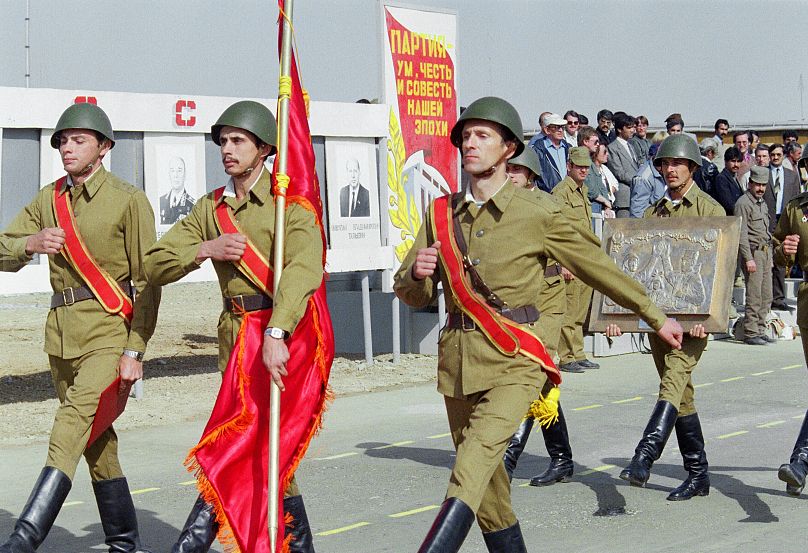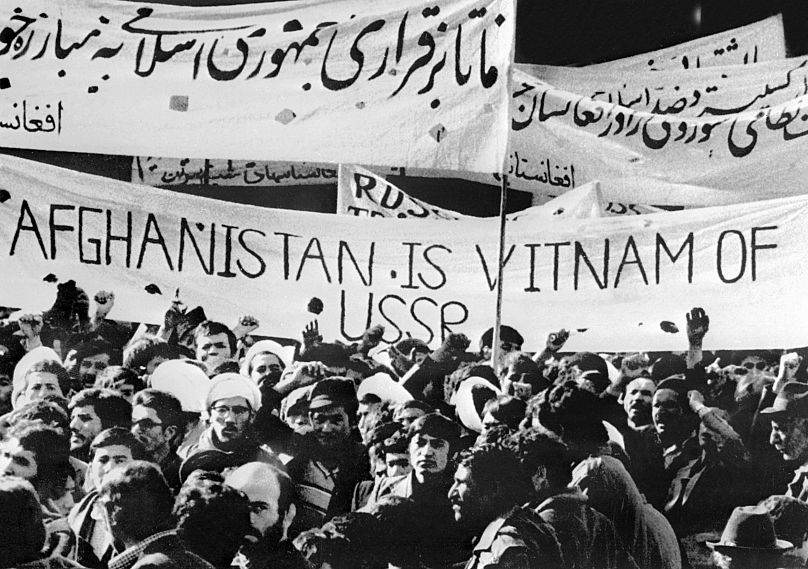Iurie Cibuc, 62, was proud to fight for the Soviet Union in Afghanistan. He doubts that a new generation of Russian soldiers feel the same about the war in Ukraine.
When Iurie Cibuc was 18-years-old, he was drafted into the Soviet army to fight in Afghanistan.
 ADVERTISEMENT
ADVERTISEMENT
 ADVERTISEMENT
ADVERTISEMENT
“I did three months of training. I learned to throw grenades, shoot with a rifle,” Cibuc, now 62, told Euronews in Chisinau, Moldova.
He joined a conflict that would cost the Soviet Union 15,000 soldiers - at least 300 of them from Moldova, then the Moldovian Soviet Socialist Republic - and become known as "the USSR’s Vietnam". The "mujahideen" that drove the Soviets from Afghanistan in 1988 would ultimately become the Taliban, the hardline Islamists that are in power in Kabul today.
Four decades later, Cibuc remembers the mujahideen - and he remembers their methods, crudely-assembled roadside bombs destroying trucks.
Most of all he remembers being scared.
"I don't think there are people without fear unless they have mental problems. We were 18, and when we got there, we were scared. There is a different soil, a different smell of the air,” he said.
But he also remembers being proud of the war they were fighting - a pride, he says, that must be absent now in the Russian soldiers currently fighting in Ukraine.
"We were young and beautiful then. It was an honour to participate in defending the borders of the USSR,” Cibuc said.
"I see no honour for the Russians now fighting in Ukraine. I think they realise what they are doing and where they have been sent. In this war, Russians kill Russians.”
Mihail Carp, another veteran, was 28 when he was sent to Afghanistan in 1985. Unlike others, he had volunteered to fight after serving in Germany and Turkmenistan. He fought there until the end of the war in 1988 when the Soviet Union withdrew from the country.
At one point during the war, his convoy was ambushed by the mujahideen.
“I was in an armoured vehicle. I jumped to one side and a grenade exploded next to me at that moment," he said.
Carp was hit with shrapnel, some of which was not removed until 2020.
But both physical and mental scars remain, even more so because some of the men he served with in Afghanistan are now fighting in Ukraine.
"It is painful for me what is happening in Ukraine today because some of my friends I fought with in Afghanistan are now in Ukraine, Russia and Belarus. I do not understand why Ukraine and Russia as sister-states could not sit down at the negotiating table and get along," he said.
'Blitzkrieg'
Carp said that, like in Afghanistan, Russia is relying on "blitzkrieg" techniques in Ukraine, hoping that the country can be bombed into submission. He thinks that the resistance of the Ukrainians took Russia by surprise.
“The growing patriotism in Ukraine in recent years has empowered people to resist. As a result, Russian have changed its tactics. If they first wanted to defeat the Ukrainian army, now they are bombing infrastructure, and many cities are under blockade," he said.
Andrei Covrig served in Afghanistan for ten years - the entire length of the conflict - training gunners, scouts and drivers. He recalls how the Moldovan soldiers stuck together, and he remains friends with some of the men in his unit today.
"I remember going to a group of Moldovan recruits and asking them who was from Rezina, my district of Moldova. One of them raised his hand then and told me that he was from the village of Tufesti, where I also studied in the last class during high school," said Covrig.
"I took him home and gave him a bowl of hot food. He then trained with me for six months in the artillery regiment, after which he went on a mission to Afghanistan. When I returned to Chisinau in 1992, I met him again, and we remained friends for life.”
'Lack of reform'
A retired colonel, Covrig noted that the U.S. supplied the rebels in Afghanistan just as it sending weapons to Ukraine today. In both cases, Russia is outgunned, he said.
"The problem with Russian weapons that don't even work and this situation is caused by significant corruption and lack of reform," he said.
It is not known how many Russian soldiers have been killed in Ukraine - and how many more may die as the war goes on - but all these years later, it is the loss of his comrades that still occupied Cibuc. In many cases, he doesn’t know what happened to his friends.
"In the two years, I spent there, about eight boys from Moldova joined the battalion I was in. They were tall, healthy boys, a little older than me. They had personalities and did not accept being humiliated by their colleagues,” he said.
After getting involved in a fight, the eight were put into an advance scouting unit as punishment, Cibuc said, meaning that they were deployed to the frontline. He never heard from them again.
“I'm still looking for them today,” he said, sighing. “I can't find them.”












